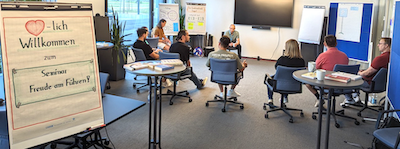 Implementation
Implementation
Training
Our training courses (in person or online) are designed individually for small groups (max. 12 people) and last between 0.5 and 5 days. The focus of the training is not purely on teaching individual leadership methods or concepts (know-how), but primarily on the personal development of managers based on their individual strengths, their personal attitude to leadership (know-why) and in line with the agreed training objectives.

n practice, classic training courses have proven to be most effective when implemented in two sections (e.g., 2 + 2 days) with a 2-3 month break between the blocks. During this time, participants can apply and test what they learned in the first block. The second block then serves to answer any questions that may have arisen, to deepen individual topics, and to develop additional skills, depending on the participants' needs.
Coaching
Coaching is a process-oriented approach that aims to support people in achieving their goals and personal development. The coach's task is to facilitate this development through active listening, effective questioning, and the provision of a safe space for personal change.
Depending on your needs, we can offer different types of coaching:
✅ Clifton Strengths® Strengths Coaching: More success and less stress by focusing on your own strengths
✅ Systemic Coaching: Personality and/or career development
✅ Co-Active Coaching: New perspectives in difficult or deadlocked situations, clarity in difficult decisions
✅ Positive Intelligence® Coaching: Increasing mental fitness to more easily overcome the small and large challenges of (professional) life
✅ Ideas while walking: Inspiration and solutions in motion – outdoors
Workshop
We design and facilitate workshops and events of various kinds, such as
✅ Team building workshops
✅ Strengths workshops
✅ Strategy development
✅ Town hall meetings
and other formats.
Especially in change processes or critical phases, it is often helpful to have such events designed and moderated by external persons:
![]() All internal stakeholders can engage equally intensively with the content
All internal stakeholders can engage equally intensively with the content
![]() Less reluctance, bias, or mistrust toward the moderator, content, and intentions when an external person is involved.
Less reluctance, bias, or mistrust toward the moderator, content, and intentions when an external person is involved.